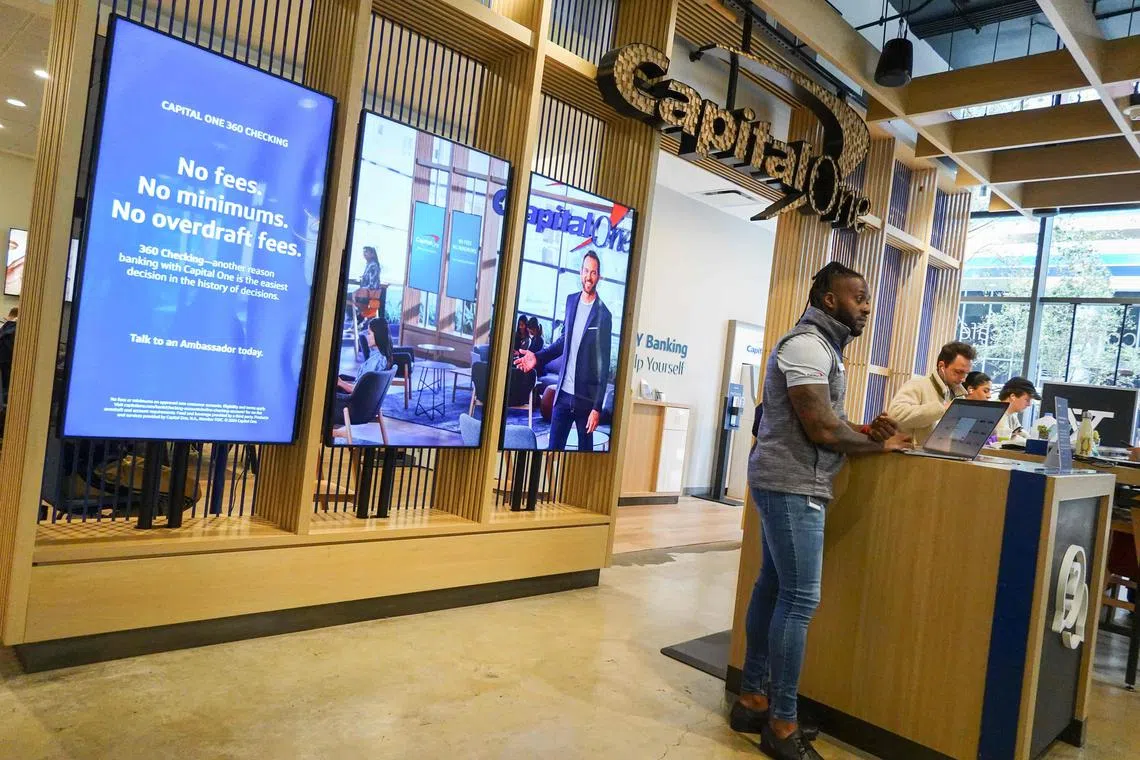Capital One to buy Discover Financial in $47.5 billion all-stock deal
Sign up now: Get ST's newsletters delivered to your inbox

The tie-up between Capital One and Discover Financial Services will combine two of the largest US credit card companies.
PHOTO: AFP
NEW YORK - Capital One, a United States consumer lender backed by investment guru Warren Buffett, said on Feb 19 that it will acquire credit card issuer Discover Financial Services in an all-stock transaction valued at US$35.3 billion (S$47.5 billion).
The tie-up, which will combine two of the largest US credit card companies, aims at building “a payments network that can compete with the largest payments networks and payments companies”, Mr Richard Fairbank, chairman and chief executive of Capital One, said in a statement.
Visa, Mastercard and American Express are among other US-based payments networks.
Discover shareholders will receive 1.0192 Capital One share for each Discover share. It represents a 26.6 per cent premium over Discover’s closing price on Feb 16.
When concluded, Capital One shareholders will own 60 per cent of the combined company, while Discover shareholders will own approximately 40 per cent.
Capital One, valued at US$52.2 billion, is the fourth-largest player in the US credit card market by volume as at 2022, according to Nilson, while Discover is the sixth.
The deal is expected to be approved by regulators late 2024 or early 2025, Capital One said.
The transaction is likely to experience intense scrutiny as Democratic President Joe Biden’s administration continues to focus on boosting competition in all areas of the economy, including a 2021 executive order aimed at bank deals.
“I predict that this deal, if it materialises, will provoke a significant pushback and receive heightened regulatory scrutiny,” said University of Michigan assistant professor of business law Jeremy Kress, who previously worked on bank merger oversight at the US Federal Reserve.
“It will be the first big test of bank merger regulation since the Biden administration’s executive order on promoting competition in 2021.”
Democratic progressives have long fought bank consolidation, arguing it increases systemic risk and hurts consumers by reducing lending, and have stepped up pressure on regulators to take a tougher stance on deals.
The pressure intensified following deals aimed at rescuing failed lenders in 2023, including JPMorgan’s purchase of First Republic Bank.
The Biden administration’s executive order required bank regulators and the US Justice Department (DOJ) to review their bank merger policies.
The DOJ subsequently said it would consider a broader range of factors when assessing bank mergers for antitrust issues, while the Office of the Comptroller of the Currency in January proposed scrapping its fast-track review process.
By assets, Discover was the 27th-largest US bank, with nearly US$150 billion in assets, while Capital One was the ninth-largest with US$476 billion in assets, Fed data shows.
The combined entity would be the sixth-largest US bank.
While the pair overlap in some areas of the credit card business, Discover is one of the four major US credit card processors, along with Visa, Mastercard and American Express.
The deal would also come at a time of increased regulatory focus on credit card fees, which are the subject of strict new rules proposed by the Consumer Financial Protection Bureau.
That agency last week flagged competition concerns in the US credit card market.
In a report, it noted that during the first half of 2023, small banks and credit unions tended to offer cheaper interest rates than the largest 25 credit card companies across all credit score tiers.
Discover reported a 6 per cent fall in fourth-quarter profit while Capital One’s profit fell 43 per cent, as banks increased provisions for losses from bad loans as rising interest rates raised the risk of consumer defaults on credit card debt and mortgages. REUTERS


